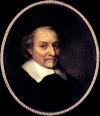Biography
Joost van den Vondel (17 November 1587 - 5 February 1679) was a Dutch writer and playwright. He is considered the most prominent Dutch poet and playwright of the 17th century. His plays are the ones from that period that are still most frequently performed, and his epic Joannes de Boetgezant (1662), on the life of John the Baptist, has been called the greatest Dutch epic.
Performance of his theatre pieces is regular. The most visible was the annual performance from 1637 to 1968 on New Year's Day of Gijsbrecht van Aemstel.
Vondel stayed productive until a very old age. Several of his most notable plays like Lucifer and Adam in Ballingschap were written after 1650, when he was already 65.
Joost van den Vondel was born on 17 November 1587 in the Große Witschgasse in Cologne, Holy Roman Empire. His parents were Mennonites from Antwerpian descent. In 1595, probably because of their religious conviction, they fled to Utrecht and from this town, eventually they settled in tolerant Amsterdam in the newly formed Dutch Republic.
At the age of 23 Vondel married Mayken de Wolff. Together they had four children, of which two died at a very young age. After the death of his father in 1608, Vondel managed the silk stockings shop the Vondels had on the Warmoesstraat in Amsterdam. In the meantime, he began to learn Latin and became acquainted with famous poets such as Roemer Visscher.
Around the year 1641 he was converted to Catholicism. This was a great shock to most of his fellow countrymen, because the main conviction and de facto state religion in the Republic was Calvinist Protestantism. It is still unclear why he became a Catholic, although his love for a Catholic lady may have played a role in this (Mayken de Wolff had died in 1635).
During his life he became one of the main advocates for religious tolerance. After the arrest, trial and the immediate beheading of the most important civilian leader of the States of Holland Johan van Oldenbarnevelt (1619) at the command of his, by then, enemy Prince Maurits of Nassau, and the Synod of Dort (1618-1619), the Calvinists had become the decisive religious power in the Republic. Public worship of Catholicism, Anabaptism and Arminianism was from then on officially forbidden; although worship in hidden houses of prayer was not persecuted. Vondel wrote many satires criticising the Calvinists and extolling Oldenbarnevelt. This, together with his new faith, made him an unpopular figure in Calvinist circles. He died a bitter man - though he was honoured by many fellow poets - on 5 February 1679.
As a legacy, Amsterdam's biggest park, the Vondelpark, bears his name, as well as his statue in the northern part of the park. The Dutch five guilder banknote bore Vondel's portrait from 1950 until its discontinuation in 1990. ..






